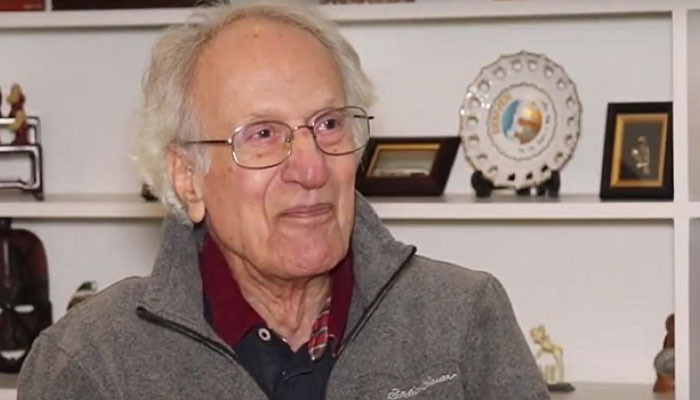Veteran journalist, HR activist Dr Mehdi Hasan passes away
LAHORE: Professor of Mass Communication Dr Mehdi Hasan passed away after a protracted illness on Wednesday at the age of 85.
He is survived by his wife Rakhshanda Hasan, sons, grandchildren, brothers, nieces, nephews, and thousands of students, Geo News reported. Dr Hasan — who was awarded the most prestigious award Sitara-i-Imtiaz by the President of Pakistan in 2012 for his services in Journalism — was a Pakistani left-wing journalist, media historian, dean of journalism and mass communication at the Beaconhouse National University and a professor of mass communication at the Punjab University. His teaching career spanned over 50 years.
He served as the chairperson of the Human Rights Commission of Pakistan (HRCP) and was one of Pakistan's prominent communication experts with a specialisation in political analysis. One of the few media historians of Pakistan, Dr Hasan was a regular commentator and panellist for TV news channels and radio stations.
Other than that, he authored many books on history, journalism, mass communication and political parties. His book "The Political History of Pakistan" is a widely used source of reference by journalists and producers.
"Distortion of facts by news media is distorting our history," was his long-held personal view. Moreover, Dr Hasan wrote many papers on the subject and participated in multiple seminars. His qualification included a PhD in mass communication and an MA in journalism from Punjab University. He was a Fulbright Scholar at the University of Colorado, where he conducted research on "Coverage of Third World Countries in the American Mass Media". He published research papers in the United States and Pakistan.
As a journalist, he served as a sub-editor and reporter at the Pakistan Press International between 1961-67. He remained an elected office-bearer of the Pakistan Federal Union of Journalists (PFUJ) five times during this period.
Dr Hasan also had been a news commentator and analyst for Pakistani television since 1964 and also served for Radio Pakistan since 1962. Apart from that, national and international mass media outlets, including Voice of America, BBC News, Deutsche Welle regularly sought his opinion on political developments in Pakistan. He contributed articles in all major newspapers of Pakistan.
His hobbies and passion included photography and he possessed 35mm cameras, including a couple of Rolleiflex cameras. His passion for photography took him to the frontline of the Lahore war zone in 1965, although he was not a professional photographer.
Pakistan Federal Union of journalists (PFUJ) has consoled the sad demise of Dr Mehdi Hassan. In a message to his family members and his long list of students and followers, PFUJ President Shehzada Zulfiqar and Secretary General Nasir Zaidi said Dr Mehdi was a beacon of light for his students and followers and his open blunt and vibrant advices for establishing democratic norms, respecting human rights and following ethical journalism will be missed in a country which is still in dire need of such personalities.
They said that Dr Mehdi Hassan always stood behind the democratic forces of the country and challenged dictatorial regime openly and never hesitated to challenge them. The HRCP, in a press release said, the Human Rights Commission of Pakistan is devastated by the loss of Dr Mehdi Hasan. “Dr Mehdi Hasan will be sorely missed and we extend our deepest condolences to his family and friends,” the HRCP statement said.
-
 Savannah Guthrie Mom Update: Unexpected Visitors Spark Mystery Outside Nancy's Home
Savannah Guthrie Mom Update: Unexpected Visitors Spark Mystery Outside Nancy's Home -
 Elle Fanning Shares Detail About Upcoming Oscars Night Plan With Surprise Date
Elle Fanning Shares Detail About Upcoming Oscars Night Plan With Surprise Date -
 Demi Lovato Spills Go-to Trick To Beat Social Anxiety At Parties
Demi Lovato Spills Go-to Trick To Beat Social Anxiety At Parties -
 Benny Blanco Looks Back At The Time Selena Gomez Lost Her Handrwritten Vows Days Before Wedding
Benny Blanco Looks Back At The Time Selena Gomez Lost Her Handrwritten Vows Days Before Wedding -
 Naomi Watts Reveals Why She Won't Get A Facelift In Her 50s
Naomi Watts Reveals Why She Won't Get A Facelift In Her 50s -
 Travis Kelce's Mom Donna Fires Back At Critic With Sarcastic Reply After Body Jab
Travis Kelce's Mom Donna Fires Back At Critic With Sarcastic Reply After Body Jab -
 Kendall Jenner Gets Candid About Her Differences With The Kardashian Clan Over Style Choices
Kendall Jenner Gets Candid About Her Differences With The Kardashian Clan Over Style Choices -
 Sam Altman Opens Up About OpenAI, Anthropic, Pentagon Conflict
Sam Altman Opens Up About OpenAI, Anthropic, Pentagon Conflict -
 Brenda Song Confesses Fascination With Conspiracy Theories
Brenda Song Confesses Fascination With Conspiracy Theories -
 Lunar Eclipse 2026: Time, Date, Sighting Locations, Know Every Detail
Lunar Eclipse 2026: Time, Date, Sighting Locations, Know Every Detail -
 Death Toll Climbs To 54 As Floods Wreck South-eastern Brazil
Death Toll Climbs To 54 As Floods Wreck South-eastern Brazil -
 Katie Price Drops Bombshell Plan To Cash In On Marriage
Katie Price Drops Bombshell Plan To Cash In On Marriage -
 Ryan Gosling Shares How Daughters' 'honest' Feedback Keeps Him Grounded
Ryan Gosling Shares How Daughters' 'honest' Feedback Keeps Him Grounded -
 Neve Campbell Explains Why She Avoids Watching Scary Movies As She Returns To 'Scream 7'
Neve Campbell Explains Why She Avoids Watching Scary Movies As She Returns To 'Scream 7' -
 Milan Tram Crash Leaves Two Dead, 39 Injured
Milan Tram Crash Leaves Two Dead, 39 Injured -
 Timothee Chalamet Touches On His Personality's Relatability With 'Marty Supreme' Role
Timothee Chalamet Touches On His Personality's Relatability With 'Marty Supreme' Role




